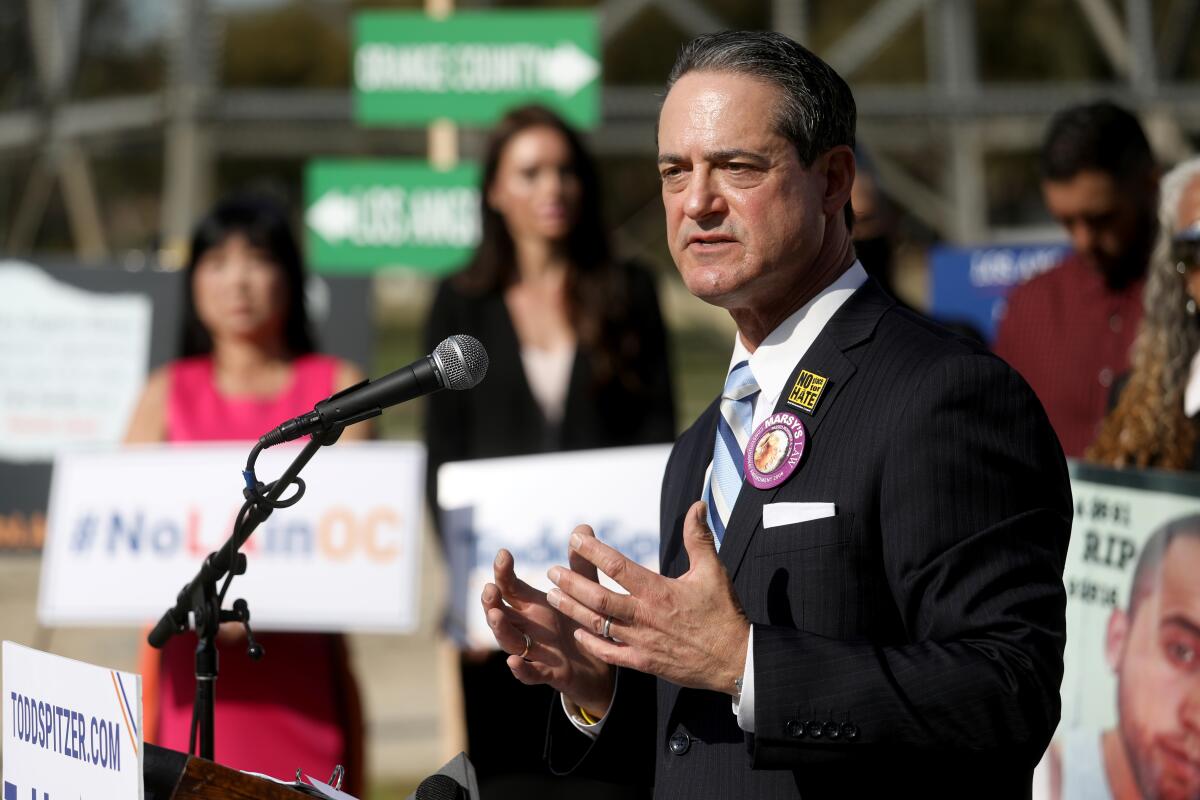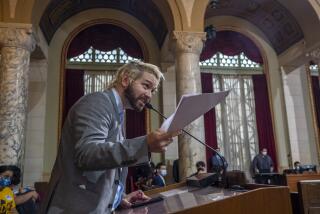Lost endorsements, calls to resign: Fallout in O.C. from Todd Spitzer’s racist comments

- Share via
Orange County Dist. Atty. Todd Spitzer is losing political support and facing calls to resign after racist comments he made while discussing the case of a Black murder defendant came to light last week.
With a primary election against two former prosecutors set for June, it is unclear how much the comments will ultimately hurt Spitzer, especially in Orange County, where tough-on-crime candidates are typically popular.
But the fallout from the comments has put Spitzer on the defensive, with fellow district attorneys dropping their endorsements and a civil rights leader saying Spitzer’s views smacked of the Jim Crow South.
“This could be a turning point in a much bigger story, or a flashpoint that gets a lot of attention and then is forgotten long before the ballots are counted. It remains to be seen which this is,” said Jodi Balma, a political science professor at Fullerton College. “History is littered with premature political obituaries, and I don’t think anyone should be writing one for Spitzer.”
Spitzer made the comments on Oct. 1 at a meeting with top prosecutors about whether to pursue the death penalty against the Black defendant, Jamon Buggs.
Spitzer said Black men dated white women to “get themselves out of their bad circumstances and bad situations,” according to a memo by then-prosecutor Ebrahim Baytieh, who was fired by Spitzer this month.
Spitzer told The Times that Baytieh misquoted him, and he actually described Black men’s motivation in dating white women as improving “their stature in the community.”
Spitzer apologized on Monday, saying that he “used an example that was insensitive.”
“I am not perfect, but an inartful comment during an hours-long debate in a double murder case is not reflective of my core beliefs or the years I have spent fighting to make our society more equitable and our communities safe for everyone,” Spitzer said in a statement.
Last week, after The Times and other publications detailed Spitzer’s comments, Riverside County Dist. Atty. Mike Hestrin took back his endorsement, describing the comments as “shocking, disappointing and in the end inexcusable.”
The district attorneys of San Diego and Alameda counties also rescinded their endorsements of Spitzer.
One of Spitzer’s opponents, Pete Hardin, called for him to resign.
On Tuesday, a dozen activists gathered outside Spitzer’s office in Santa Ana, waving signs that read “#NoRacismInOC” and chanting, “Hey hey, ho ho, Todd Spitzer has got to go.”
Darlene Futrel, president of the Orange County chapter of the National Action Network, said Spitzer’s comments destroyed the credibility of law enforcement in the eyes of people of color.
“Although Spitzer denies that he is a racist and that his remarks were racist, there’s a passage in a famous book that says you’ll know a tree by the fruit it bears,” Futrel said, paraphrasing a Bible verse.
Rick Callender, president of the California and Hawaii State Conference NAACP, called Spitzer’s views “Klan like” and said he should resign immediately.
“The disgusting and atrociously racist beliefs of D.A. Spitzer disqualifies him from being an elected official at any level,” Callender wrote in a statement. “No member of modern civilized society would support or even condone these kind of Jim Crow views and statements.”
Some Spitzer supporters have defended him, arguing that race is being used unfairly as a political weapon.
“The fact is Todd has been a great district attorney, not only for the Black community but all people of color and Orange County residents in general,” said Bobby McDonald, president of the Black Chamber of Orange County.
Experts say that while the loss of endorsements is unusual in a race for district attorney, many voters may not care much, especially when it comes to a candidate like Spitzer with widespread name recognition.
Spitzer, a Republican who served as a prosecutor in the district attorney’s office, has a political career spanning three decades in Orange County, serving on a school board, the county Board of Supervisors and in the state Assembly, all without losing an election.
In 2018, he won the district attorney job over incumbent Tony Rackauckas, in large part because of a scandal over the use of jailhouse informants.
On Tuesday, Tracy Miller, a former top prosecutor in Spitzer’s office, filed a lawsuit against the county in which she alleges that Spitzer made “non race neutral statements.”
In June 2020, according to Miller’s lawsuit, Spitzer allegedly suggested that a prosecutor be assigned to a case because she was Black.
Spitzer also allegedly said that he needed “a brown or a black face” to accompany him to an NAACP event, according to the lawsuit.
Buggs is charged with fatally shooting Darren Partch inside a Newport Beach apartment, along with Partch’s friend, Wendi Miller, in April 2019.
Prosecutors believe Buggs’ motive was jealousy over an ex-girlfriend, who is white.
During the Oct. 1 meeting about whether to pursue the death penalty, prosecutors discussed prior allegations of domestic violence against Buggs.
Spitzer asked about the race of Buggs’ previous girlfriends, then made the comments about why Black men date white women, even after Baytieh cautioned that the topic was irrelevant and inappropriate, according to Baytieh’s memo, dated Dec. 3.
Spitzer fired Baytieh, who was once a close advisor, citing an investigation into whether Baytieh withheld evidence from defense attorneys in a different murder case.
The following week, Baytieh’s memos describing Spitzer’s comments were leaked to the media. Baytieh is running to be an Orange County Superior Court judge.
Spitzer said in an interview last week that he asked the questions at the October meeting to address the possible issue of cross racial identification — how well Buggs, as a Black man, could identify a white woman like Miller.
Baytieh argued in a Dec. 22 memo that Spitzer’s comments should be disclosed to defense attorneys because of a state law prohibiting the use of race in seeking a conviction or imposing a sentence.
On Jan. 26, Spitzer announced that he was reassigning the Buggs case to a new prosecutor and supervisor. He also walled off the new prosecution team from the old team.
The next day, the new prosecutor submitted a court filing indicating that his office was not pursuing the death penalty against Buggs.
Newport Beach Police Acting Lt. Court Depweg wrote in a letter filed in court this month that he had warned the head of Spitzer’s homicide division that “it was disappointing that he and so many of his colleagues would try and cover this matter up, as we all know the cover-up is always worse than the crime.”
Prosecutors did not tell Partch’s mother, Brenda Partch, about dropping the death penalty, despite a victims’ rights law requiring that families be informed of crucial decisions, said her attorney, Rick Welsh.
“It was stunning to her,” Welsh said. “She is just so sad and angry. She feels as though this man who killed her son has won.”
More to Read
Sign up for Essential California
The most important California stories and recommendations in your inbox every morning.
You may occasionally receive promotional content from the Los Angeles Times.











